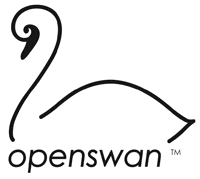This article has multiple issues. Please help improve it or discuss these issues on the talk page . (Learn how and when to remove these messages)
|
| Openswan | |
|---|---|
 | |
| Stable release | 3.0.0 [1] / 22 January 2021 |
| Repository | |
| Operating system | Linux, FreeBSD |
| Predecessor | FreeS/WAN |
| Available in | C |
| Type | IPsec |
| License | GNU General Public License |
| Website | openswan |
In the field of computer security, Openswan provides a complete IPsec implementation for Linux and FreeBSD.
Contents
Openswan, begun as a fork of the now-defunct FreeS/WAN project, continues to use the GNU General Public License. Unlike the FreeS/WAN project, it does not exclusively target the Linux operating system.